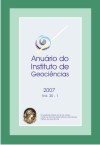The museum's contribution for the establishment and diffusion of paleontology
DOI:
https://doi.org/10.11137/2007_1_158-167Abstract
Since the calls "cabinets of curiosities", the essence of natural history was consolidating itself with the birth of the museums and the development of the Museums of Natural History. This consolidation was reached through following activities: expeditions, field trips, collection classification works, catalogues of diffusion of scientific knowledge, educativ activities and expositions. The present paper intends to discuss the importance of the museal institutions for the studies of Paleontology; since the museums of Natural History had exerted a pioneering paper in the institutionalization of certain areas of knowledge, as Palaeontology, Anthropology and Experimental Physiology, in Brazil. The Paleontological studies in museums had collaborated in the specialization and modernization of the appearance of "new museum idea". As this new concept the museum is a space of diffusion of scientific knowledge, represented as an object that reflects the identity of the society without an obligator linking with physical constructions. However, the Brazilian museums have been sufficiently obsolete, with problems that involve acquisition and maintenance of collections to production of temporary or permanent exhibitions. When the Brazilian institutions of natural history are analyzed they are not organized on the new museum conception and the digital age as the North American and European ones. Despite the difficulties found by the Museums since its birth as Institution in the 18th century, the contemporary development of Museology and Palaeontology as Science had contributed for the consolidation and institutionalization of both, helping the diffusion of scientific knowledge.Downloads
Download data is not yet available.
Downloads
Published
2007-01-01
How to Cite
Vieira, A. C. M. (2007) “The museum’s contribution for the establishment and diffusion of paleontology”, Anuário do Instituto de Geociências. Rio de Janeiro, BR, 30(1), pp. 158–167. doi: 10.11137/2007_1_158-167.
Issue
Section
Article
License
This journal is licensed under a Creative Commons — Attribution 4.0 International — CC BY 4.0, which permits use, distribution and reproduction in any medium, provided the original work is properly cited.















